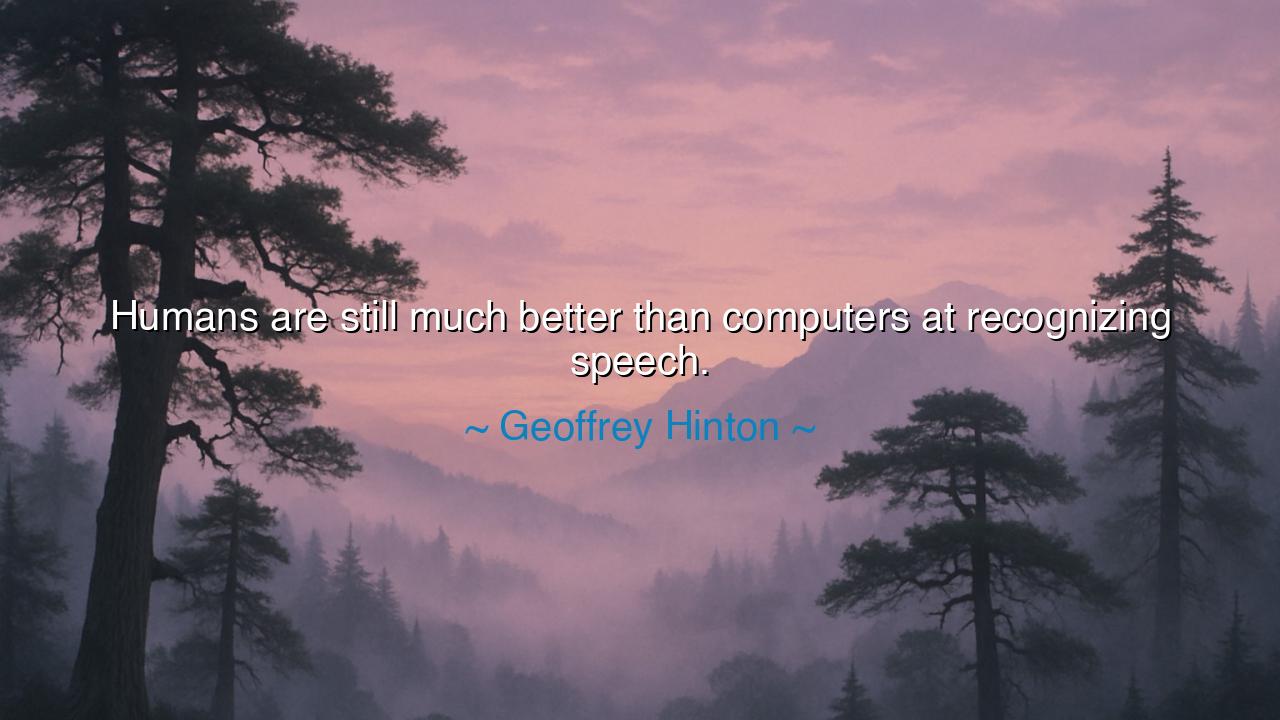
Humans are still much better than computers at recognizing






Listen, O children of the earth, to the words of Geoffrey Hinton, who speaks of the power and limitations of both humans and computers: "Humans are still much better than computers at recognizing speech." These words offer not only an insight into the current state of technology but a deeper reflection on the inherent complexity of human nature. While computers have advanced greatly in their ability to process and analyze data, Hinton’s statement reminds us that the human mind, with all its nuances and capabilities, still holds dominion in areas that even the most advanced machines cannot replicate. The ability to understand and recognize speech is not simply a mechanical task—it is an art rooted in emotion, context, and intuition.
In the ancient world, when the great philosophers and orators spoke, their words carried weight because they were understood not only by their content but also by their delivery, their tone, and the subtle cues embedded within the speech. Socrates, for example, did not simply engage in logical debate; he listened to the emotions, the context, and the underlying intentions of those around him. His dialogues were not about merely exchanging words, but about engaging the deeper meaning within the conversation, responding not just to what was said, but to how it was said. Just as Socrates understood that speech was alive with intention and emotion, so too does Hinton’s quote highlight the depth of the human capacity to interpret and respond to speech in ways that machines cannot.
Consider the story of Aristotle, the philosopher who sought to understand the very nature of human reasoning. In his work, he explored how people use language to convey not just facts, but feelings, ethics, and nuance. Aristotle understood that speech was more than just a sequence of sounds; it was a vehicle for connection, a way in which humans conveyed their souls, their intentions, and their wisdom. Today, computers may be able to transcribe words, but they still struggle with the subtleties of context, emotion, and meaning that humans easily pick up on. Hinton’s insight into the limitations of technology serves as a reminder that machines—no matter how advanced—are still distant from the full complexity of human understanding.
In the modern age, speech recognition technology has made great strides. Voice assistants like Siri, Alexa, and Google Assistant can understand basic commands, but they often struggle with accents, slang, or the contextual meaning behind words. For example, the word “bank” could refer to a financial institution or the side of a river, and humans intuitively grasp this meaning from context, while computers might falter without further clarification. The human ear is not just a passive receiver of sounds but an active participant in deciphering meaning. We hear not just the words spoken, but also the emotion, the intent, and the nuance beneath them, a task far more complex than any computer can yet perform.
The lesson here, O children of the earth, is one of humility and awareness. As machines advance, they may surpass us in many tasks—calculating, storing information, even recognizing patterns in data. But there are aspects of being human, such as our ability to understand speech, that still remain beyond their reach. The human mind, with its capacity for emotion, intuition, and contextual understanding, is still the master in realms that require more than just logical processing. Technology can be a tool, a guide, but it is not a replacement for the depth of human connection and the richness of our understanding of the world around us.
In your own lives, O seekers of wisdom, let this be a reminder to never underestimate the power of the human mind. Even as technology continues to advance, remember that it is your capacity for understanding, for empathy, and for contextual judgment that makes you truly unique. Use technology, but do not lose sight of the inherent wisdom and insight that lies within you. Just as Socrates, Aristotle, and other great minds of the past used the spoken word to connect, to learn, and to grow, so too must we continue to value and cultivate our own ability to listen and understand, not just through machines, but through the deep well of human connection.
Remember, O children of the earth, that while computers may assist us in many tasks, it is the human mind, with its empathy, intuition, and ability to read the soul behind the words, that remains our greatest tool for truly understanding the world and each other. Let us honor this gift, for it is what makes us more than mere machines—it is what makes us human.






AAdministratorAdministrator
Welcome, honored guests. Please leave a comment, we will respond soon